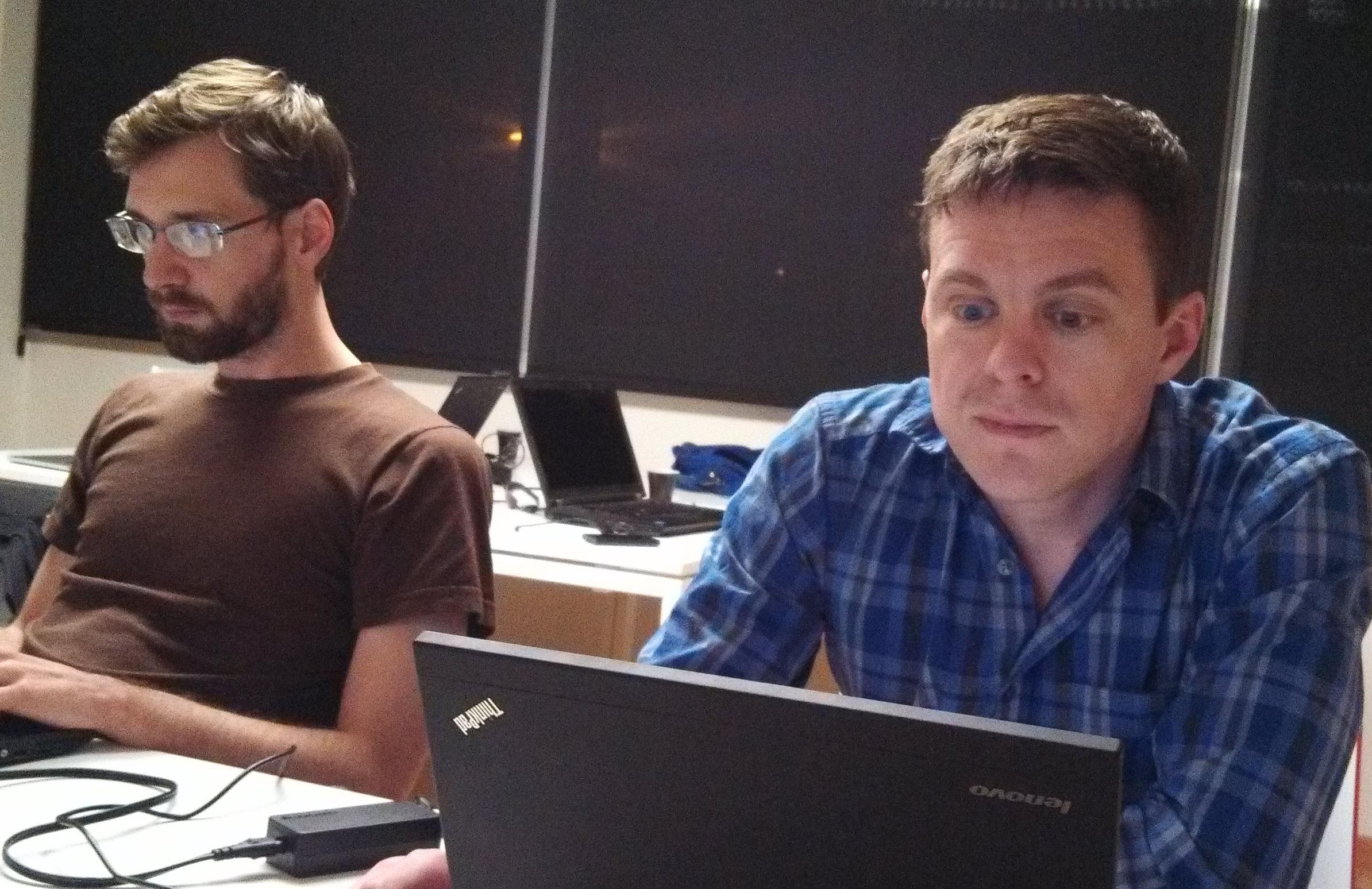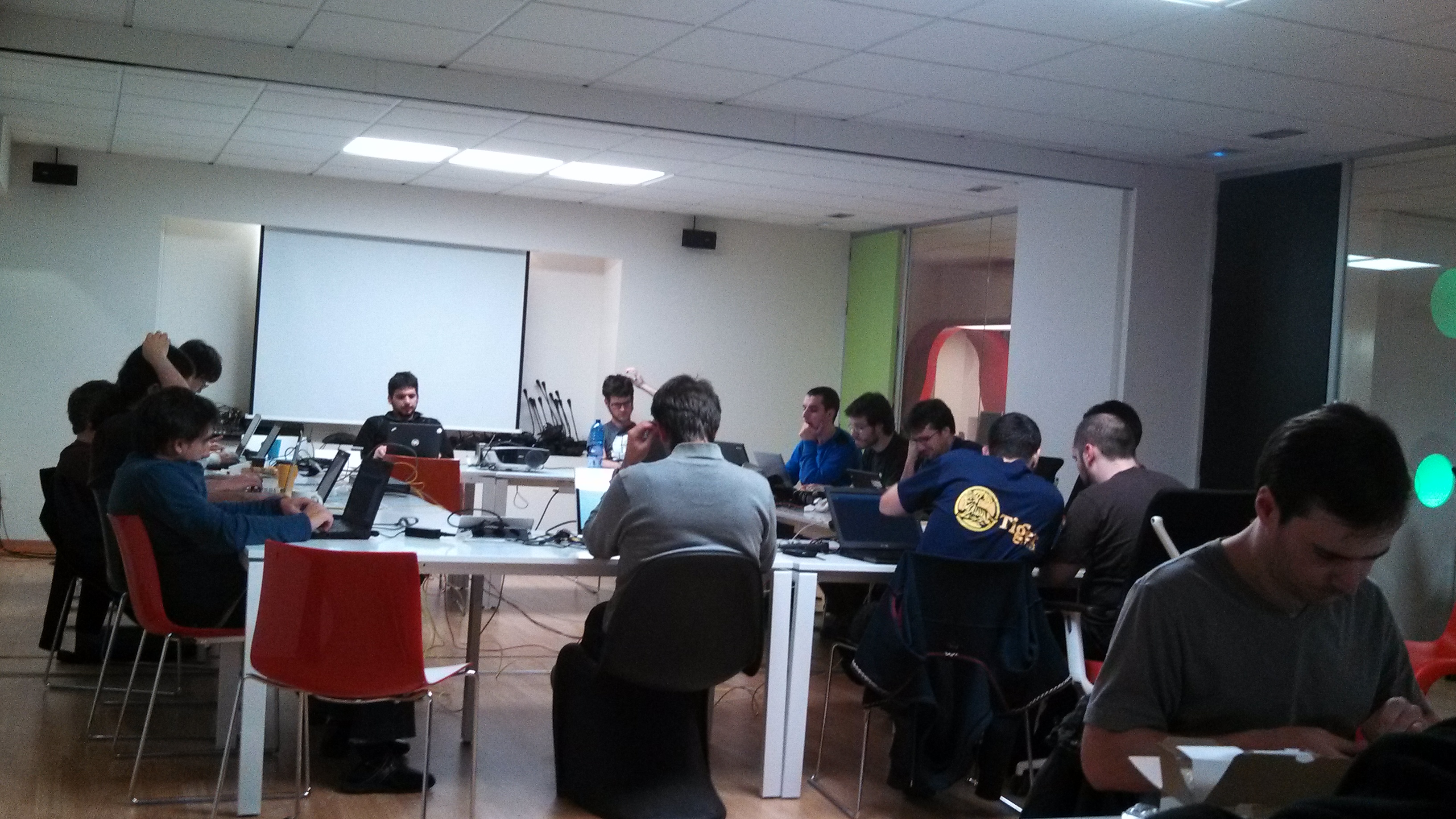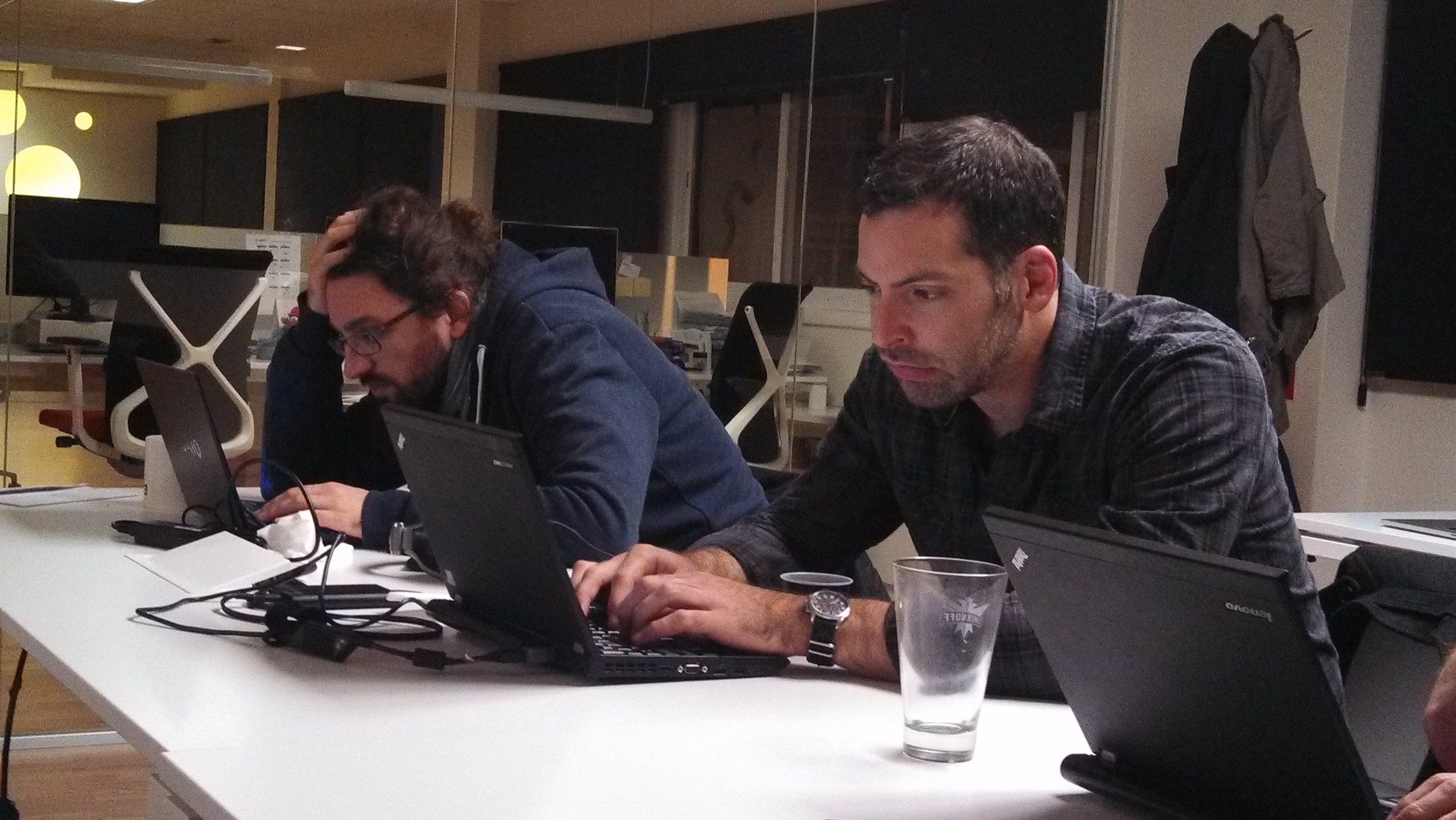It's not every day that a student messing around with keystroke loggers
comes to fame through slashdot. Nonetheless, systematically rigging an election and getting sentenced to
12 months in a dorm with bars has helped raise 22 year old Matthew Weaver's profile well above that of the average
script kiddie.
Now let's stop and reflect on poor Weaver's future. You may be thinking that with an exchange program like this on his academic record he won't be so popular with employers. Given that he was busted by campus security rather than the FBI he won't even attract the interest of those companies who hire ex-hackers. So where could he go?
How is it done in Australia?

Not too long ago, when I was a student myself, one of our prominent universities was subjected to a very similar scam. Four members of the
Tin Tin for NUS ticket at
La Trobe University were implicated in stuffing the ballot the old fashioned way. The incidents even share the characteristics of chronic stupidity: just as Weaver had been caught voting for himself 259 times from the same IP address in a campus computer lab,
team Tin Tin had tried to hand their bag of manipulated postal votes directly to the deputy returning officer rather than discretely posting them through the internal mail.
According to an
official report by the Deputy Returning Officer,
Karsten Haley, all four candidates were charged with
Dishonest Conduct and
Interfering with Ballot Papers. Unfortunately, the report notes that
La Trobe University SRC Electoral Regulations do not empower the Returning Officer or Deputy to enforce charges or disciplinary procedures and the charges were never faced by the accused.
Given the seriousness of the matter, Haley did not give up his attempts to hold them to account. He escalated it to the Dean of the college and then to the University Secretary. He reports that
"their disinterest was extraordinary" and that nobody would involve the police.
Young Labor suspended
Just over a year later, in 1997, the ALP's youth division for the state of Victoria,
Young Labor, was suspended after attempts to rig the ballot to elect the
Young Labor leadership team. The guilty parties were never publicly named. Nobody was formally suspended or expelled and this simply left them with more time on their hands to invest their energy in other elections. The suspension of
Victorian Young Labor remained in effect for a number of years.

The specific allegations about the Young Labor ballot suggest that those people particularly keen to win had printed fake student cards and given them to stooges who would impersonate other Young Labor members who had not attended to vote in person.
Where are they now?
It is no co-incidence that these students were (and still are) members of
Labor Unity, a powerful faction within Australia's ruling Labor Party, the
ALP. Most political organisations would presumably express concern about these allegations. The ALP does things differently. One of the students who withdrew his nomination in La Trobe, Mr Larocca, subsequently
became Mayor in the
City of Moreland, one of the ALP's strongholds. Even more remarkably from an outsider's viewpoint, another of these figures, Stephen Donnelly, is currently employed as the Assistant State Secretary of the ALP in Victoria.
Communications like this newsletter reveal that he is one of the key figures in the party's pre-selection process. He has recently been appointed to direct the ALP's 2013 federal election campaign for the state of Victoria.
Another co-incidence
On the same weekend that Weaver was in the news for his antics, Donnelly's latest employer, the ALP's Victorian branch, was conducting pre-selection ballots to choose candidates for the upcoming federal election. So it's no surprise that Monday's newspaper headlines
report fresh allegations of voting irregularities.
Sadly, I've seen some of
Labor Unity's bad behavior first hand. About 10 years ago I was living in South Melbourne, which is in the federal electoral district of
Melbourne Ports. A young female friend of mine, a member of the local Elwood branch of the ALP, had spent election day handing out brochures for an ALP candidate in a marginal seat rather than assisting the controversial local ALP candidate,
Michael Danby. A few days later I was witness to an incident where Danby aggressively confronted this young woman and demanded to know why he hadn't seen her handing out his own leaflets on polling day. He stood within centimeters of her and was literally looking down on her as he demanded some kind of apology to sooth his bruised ego. She looked terrified and barely responded. Within moments one of his handlers approached and physically moved Danby away from this young woman, I dare to think where things would have gone otherwise.
Eye for talent
Remarkably, at the same time, the infamous Stephen Donnelly had started shadowing Danby in his movements about the district. Fresh out of university, his talents had been recognised by Danby and he was employed in Danby's office, enabling him to continue honing his skills on a full-time basis with a tax-payer funded salary.
What a remarkable contrast to the story of Weaver. Can anybody imagine a US congressman collecting Weaver from the prison gates and deploying him to an office on Capitol Hill?
The biggest bankruptcy in student history
Around the same time, Donnelly's
Student Unity, the student arm of
Labor Unity were successful in taking over the student union of my own campus,
the University of Melbourne. Not long after I graduated I heard that they had
been accused of skimming off $1 million from catering providers and a high-risk $46 million property transaction that put the organisation into liquidation.
Unlike Mr Weaver, who's scheme at Cal State barely got off the ground, none of those involved in the Melbourne University incident has faced criminal proceedings. One ALP figure, Andrew Landeryou,
spent several months in Costa Rica while wanted for questioning in the Supreme Court. His wife has just been
endorsed for a seat in the Senate with support from various
Labor Unity figures
including Danby.
The Gillard questions
In 1996, around the same time that Donnelly & Co. were romping around student unions learning the tricks of the political trade, a lawyer quietly departed from the firm
Slater and Gorden after an internal investigation into a property transaction linked to a union slush fund. Like Donnelly, this lawyer's next move was to take employment in the office of a Labor Party MP. More recently she was backed by
Labor Unity to become Prime Minister. The union slush fund remains under investigation, frustrated by the
disappearance of documents.
The $60 million heist
Recently I blogged about Gillard and Abbott, leaders of the two main political parties in Australia,
agreeing to take $60 million of taxpayer money to fund their parties' campaigns in the upcoming federal election, giving themselves an obscenely unfair unadvantage over all other contestants.
Where would that money end up? In the case of the ALP, does it appear likely that figures like the Victorian ALP's federal campaign director, Mr Donnelly, would be involved in the expenditure?
National shame
With this background, it becomes easier to understand the quality (or lack of it) in Australia's national leadership.
When you consider that the generation responsible for the La Trobe incident, the
Young Labor suspension and the MUSU bankruptcy are now growing into positions of greater responsibility in the ALP it leaves me feeling the quality of leadership is only going to get a lot worse before it starts getting better.

For example, the recent incident where
coloured people were fed to the sharks has nothing to do with the worldwide refugee crisis and everything to do with maintaining the dumbed-down level of political discourse that
Labor Unity thugs and their followers can cope with. Real issues like climate change and energy policy, for example,
appear to be beyond the pay grade of Australia's political class

It is startling that up to her own recent demise, Gillard herself had repeatedly begged the public to stop asking questions about her own past and remember that
Labor politicians are innocent until proven guilty - yet she had
a pregnant coloured woman thrown into a concentration camp on unfounded fears about "national security". No evidence has ever been presented that poor Ranjini committed a crime, but the houses bought with money from trade unions, transactions handled through Gillard's own office, seem to be as
solid as bricks and mortar.
If only poor
Matthew Weaver had been an Australian, how much further would his star have risen?
Update:
please sign the petition at change.org asking La Trobe university to re-examine the report and refer it formally to the police. If you are concerned about the plight of poor Ranjini and other people subject to Australia's domestic rendition program, please take a moment to see Letters for Ranjini
 A new release 0.1.0 of the RPushbullet package (interfacing the neat Pushbullet service) landed on CRAN today.
It brings a number of goodies relative to the first release 0.0.2 of a few months ago:
A new release 0.1.0 of the RPushbullet package (interfacing the neat Pushbullet service) landed on CRAN today.
It brings a number of goodies relative to the first release 0.0.2 of a few months ago:
 At my university, we recently held an exam that covered a bit of Haskell, and a simple warm-up question at the beginning asked the students to implement
At my university, we recently held an exam that covered a bit of Haskell, and a simple warm-up question at the beginning asked the students to implement  Update on 2014-03-03: quoting Colin Watson from
Update on 2014-03-03: quoting Colin Watson from 
 Wow, today was pretty crazy in terms of the travel we managed to pack into one day.
This morning, Zoe woke up at about 5:30am and jumped into bed with me for a
snuggle and another half hour nap. After that we got up. Zoe had been eyeing
off the egg cups in the house, and so I'd wanted to do soft-boiled eggs for
breakfast. So we doused ourselves in mosquito repellent and raided the chicken
coop.
I don't think I've ever cooked soft-boiled eggs in my entire adult life, and
today wasn't an exception. They came out hard-boiled. Zoe still ate them anyway,
she just couldn't do the toast soldier thing. I need to buy some egg cups
for home and we can try again. I hear the Thermomix can do boiled eggs.
After breakfast and a shower, I got stuck into packing up and cleaning the
house, and Zoe watched TV. At 8am she turned off the TV and declared she wanted
to play in the yard. It was nice to see that she wanted to do something more
than just veg out in front of the TV, without prompting.
I had us all packed up by about 8:30am and we were only 5 minutes from where
the barge docked, so we drove over to the other end of the island to take a
look at the place at high tide. It was quite different from the two days before
in the afternoon at low tide. The stick that we'd walked out to was barely
above the waterline.
Then we drove back to wait in the queue for the barge. The barge journey back
was uneventful and we made it back home by 10am, which was about the
time I was expecting, and rendezvoused with my girlfriend, and did a fast
unpack and repack. We then headed to the airport, arriving comfortably with
enough time to check our luggage and get some lunch to take onto the plane.
Zoe was great for the flight down. She watched Brave on the in-flight
WiFi entertainment on my phone, and got to fit the whole movie in before we
landed, but this meant she skipped a nap.
By the time we got to Melbourne Airport, she was in the post-tired manic state,
but we weren't in any particular rush, so we had a very roundabout trip to
baggage claim, and then after we'd acquired some Myki cards, caught a taxi to
our accommodation in South Melbourne.
After we'd unpacked and settled in, and I'd gotten some supplies from the local
convenience store, we caught a tram into Bourke Street to go to Chinatown for
dinner, after checking out the view from the observation deck on the 28th
floor.
We found a great dumpling place, and Zoe really enjoyed the pork dumpling and
noodle soup that I ordered for her. She kept alternating between eating the
noodles with her training chopsticks and the broth with one of the big spoons.
She was getting really over-tired and over-stimulated by this point, so it was
quite a bit of cat-herding to get to Chinatown, and more so getting back to a
tram to come back.
We got home, Zoe had a quick shower and went to bed without a peep. Her room is
nice and dark, so I'm hoping that she'll have a bit of a sleep in tomorrow.
(Wishful thinking).
I'm really quite pleased with how smoothly today's travel went. Everything went
off without a hitch.
Wow, today was pretty crazy in terms of the travel we managed to pack into one day.
This morning, Zoe woke up at about 5:30am and jumped into bed with me for a
snuggle and another half hour nap. After that we got up. Zoe had been eyeing
off the egg cups in the house, and so I'd wanted to do soft-boiled eggs for
breakfast. So we doused ourselves in mosquito repellent and raided the chicken
coop.
I don't think I've ever cooked soft-boiled eggs in my entire adult life, and
today wasn't an exception. They came out hard-boiled. Zoe still ate them anyway,
she just couldn't do the toast soldier thing. I need to buy some egg cups
for home and we can try again. I hear the Thermomix can do boiled eggs.
After breakfast and a shower, I got stuck into packing up and cleaning the
house, and Zoe watched TV. At 8am she turned off the TV and declared she wanted
to play in the yard. It was nice to see that she wanted to do something more
than just veg out in front of the TV, without prompting.
I had us all packed up by about 8:30am and we were only 5 minutes from where
the barge docked, so we drove over to the other end of the island to take a
look at the place at high tide. It was quite different from the two days before
in the afternoon at low tide. The stick that we'd walked out to was barely
above the waterline.
Then we drove back to wait in the queue for the barge. The barge journey back
was uneventful and we made it back home by 10am, which was about the
time I was expecting, and rendezvoused with my girlfriend, and did a fast
unpack and repack. We then headed to the airport, arriving comfortably with
enough time to check our luggage and get some lunch to take onto the plane.
Zoe was great for the flight down. She watched Brave on the in-flight
WiFi entertainment on my phone, and got to fit the whole movie in before we
landed, but this meant she skipped a nap.
By the time we got to Melbourne Airport, she was in the post-tired manic state,
but we weren't in any particular rush, so we had a very roundabout trip to
baggage claim, and then after we'd acquired some Myki cards, caught a taxi to
our accommodation in South Melbourne.
After we'd unpacked and settled in, and I'd gotten some supplies from the local
convenience store, we caught a tram into Bourke Street to go to Chinatown for
dinner, after checking out the view from the observation deck on the 28th
floor.
We found a great dumpling place, and Zoe really enjoyed the pork dumpling and
noodle soup that I ordered for her. She kept alternating between eating the
noodles with her training chopsticks and the broth with one of the big spoons.
She was getting really over-tired and over-stimulated by this point, so it was
quite a bit of cat-herding to get to Chinatown, and more so getting back to a
tram to come back.
We got home, Zoe had a quick shower and went to bed without a peep. Her room is
nice and dark, so I'm hoping that she'll have a bit of a sleep in tomorrow.
(Wishful thinking).
I'm really quite pleased with how smoothly today's travel went. Everything went
off without a hitch.

 Yes, the title is just a scootch self-aggrandising, but I m rather chuffed
with myself at the moment, so please forgive me.
It all started with my phone (a regular Samsung Galaxy S3) suddenly refusing
to boot, stuck at the initial splash screen ( Samsung Galaxy SIII
GT-I9300 ). After turning it off and on again a few times (I know my basic
problem-solving strategies) and clearing the cache, I decided to start
looking deeper. In contrast to pretty much every other Android debugging
experience ever, I almost immediately found a useful error message in the
recovery system:
Yes, the title is just a scootch self-aggrandising, but I m rather chuffed
with myself at the moment, so please forgive me.
It all started with my phone (a regular Samsung Galaxy S3) suddenly refusing
to boot, stuck at the initial splash screen ( Samsung Galaxy SIII
GT-I9300 ). After turning it off and on again a few times (I know my basic
problem-solving strategies) and clearing the cache, I decided to start
looking deeper. In contrast to pretty much every other Android debugging
experience ever, I almost immediately found a useful error message in the
recovery system:
 For the fifth year in a row the fearless WebKitGTK+ hackers have gathered in A Coru a to bring GNOME and the web closer. Igalia has organized and hosted it as usual, welcoming a record 30 people to its office. The GNOME foundation has sponsored my trip allowing me to fly the cool 18 seats propeller airplane from Lisbon to A Coru a, which is a nice adventure, and have pulpo a feira for dinner, which I simply love! That in addition to enjoying the company of so many great hackers.
For the fifth year in a row the fearless WebKitGTK+ hackers have gathered in A Coru a to bring GNOME and the web closer. Igalia has organized and hosted it as usual, welcoming a record 30 people to its office. The GNOME foundation has sponsored my trip allowing me to fly the cool 18 seats propeller airplane from Lisbon to A Coru a, which is a nice adventure, and have pulpo a feira for dinner, which I simply love! That in addition to enjoying the company of so many great hackers.







 A nice set of recent posts have done a great job detailing the remaining ways that a root user can get at kernel memory. Part of this is driven by the ideas behind UEFI Secure Boot, but they come from the same goal: making sure that the root user cannot directly subvert the running kernel. My perspective on this is toward making sure that an attacker who has gained access and then gained root privileges can t continue to elevate their access and install invisible kernel rootkits.
An outline for possible attack vectors is spelled out by Matthew Gerrett s continuing
A nice set of recent posts have done a great job detailing the remaining ways that a root user can get at kernel memory. Part of this is driven by the ideas behind UEFI Secure Boot, but they come from the same goal: making sure that the root user cannot directly subvert the running kernel. My perspective on this is toward making sure that an attacker who has gained access and then gained root privileges can t continue to elevate their access and install invisible kernel rootkits.
An outline for possible attack vectors is spelled out by Matthew Gerrett s continuing 

 Not too long ago, when I was a student myself, one of our prominent universities was subjected to a very similar scam. Four members of the Tin Tin for NUS ticket at
Not too long ago, when I was a student myself, one of our prominent universities was subjected to a very similar scam. Four members of the Tin Tin for NUS ticket at  The specific allegations about the Young Labor ballot suggest that those people particularly keen to win had printed fake student cards and given them to stooges who would impersonate other Young Labor members who had not attended to vote in person.
Where are they now?
It is no co-incidence that these students were (and still are) members of Labor Unity, a powerful faction within Australia's ruling Labor Party, the
The specific allegations about the Young Labor ballot suggest that those people particularly keen to win had printed fake student cards and given them to stooges who would impersonate other Young Labor members who had not attended to vote in person.
Where are they now?
It is no co-incidence that these students were (and still are) members of Labor Unity, a powerful faction within Australia's ruling Labor Party, the  For example, the recent incident where
For example, the recent incident where 
 A boy died.
He knew he was dying. He tried to get help. We don't know if it
occurred to him to switch off the modem and make a phone call, or
if he was too weak to get up and do it. We know he sent an email.
He didn't type perfect English at the best of times, and as his
life slipped away from him, he misspelled many things. He
misspelled ambulance . He may have misspelled diabetes .
That was all fine the meaning was clear enough but the bit where
it gets tragic is that he misspelled .net in the To: line.
So instead of arriving at its destination, the NOC of his employer,
where it would have opened up a ticket and been seen by a human
at some point, the email bounced.
We will never know whether they could have or would have done
anything in time. We will never know if, had whoever been on
postmaster duty at his ISP at the time been paying attention,
he could have been saved.
These things were debated angrily, by people struggling to
make sense of something, but it changes nothing. The email
bounced, and he died.
A boy died.
He knew he was dying. He tried to get help. We don't know if it
occurred to him to switch off the modem and make a phone call, or
if he was too weak to get up and do it. We know he sent an email.
He didn't type perfect English at the best of times, and as his
life slipped away from him, he misspelled many things. He
misspelled ambulance . He may have misspelled diabetes .
That was all fine the meaning was clear enough but the bit where
it gets tragic is that he misspelled .net in the To: line.
So instead of arriving at its destination, the NOC of his employer,
where it would have opened up a ticket and been seen by a human
at some point, the email bounced.
We will never know whether they could have or would have done
anything in time. We will never know if, had whoever been on
postmaster duty at his ISP at the time been paying attention,
he could have been saved.
These things were debated angrily, by people struggling to
make sense of something, but it changes nothing. The email
bounced, and he died.
 This was a good year for plums in the garden, both for the yellow plums and
for the Italian prunes - enough so that it took some doing to figure out what
to do with them all. Since I'm not in a hurry to set up a still and make
slivovic, and you can only pawn so many plums off on friends and neighbors,
I had on the order of 15 pounds of Italian prunes to dispense with.
With our change of diet to eliminate extra carbs, Patty and I have both been
experimenting with reduced-carb desserts in the kitchen. And I've always
been fond of central European (e.g., German) desserts, which tend to be
sweetened much more lightly than American equivalents. Indeed, my earliest
impression of "coffee cake" comes from the home of an elderly couple who
were friends of the family, who served a delicious plum cake in their home.
She was from Bavaria, so I guess she probably wouldn't have called it
Zwetchgendatschi like the Austrians do (if they even really call it that; I
have my suspicions that this is a made-up name designed to poke fun at the
foreigners). Maybe she would have called it Pflaumenkuchen. The Internet
calls it
This was a good year for plums in the garden, both for the yellow plums and
for the Italian prunes - enough so that it took some doing to figure out what
to do with them all. Since I'm not in a hurry to set up a still and make
slivovic, and you can only pawn so many plums off on friends and neighbors,
I had on the order of 15 pounds of Italian prunes to dispense with.
With our change of diet to eliminate extra carbs, Patty and I have both been
experimenting with reduced-carb desserts in the kitchen. And I've always
been fond of central European (e.g., German) desserts, which tend to be
sweetened much more lightly than American equivalents. Indeed, my earliest
impression of "coffee cake" comes from the home of an elderly couple who
were friends of the family, who served a delicious plum cake in their home.
She was from Bavaria, so I guess she probably wouldn't have called it
Zwetchgendatschi like the Austrians do (if they even really call it that; I
have my suspicions that this is a made-up name designed to poke fun at the
foreigners). Maybe she would have called it Pflaumenkuchen. The Internet
calls it  (This post contains some discussion of rape and sexual assault but does not go into any specifics)
(This post contains some discussion of rape and sexual assault but does not go into any specifics)